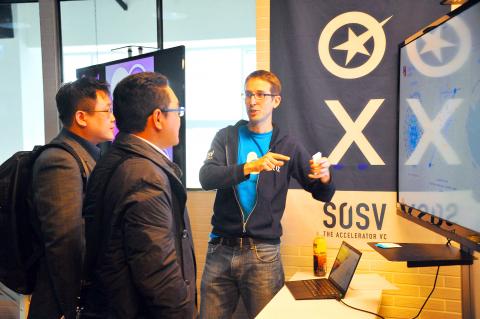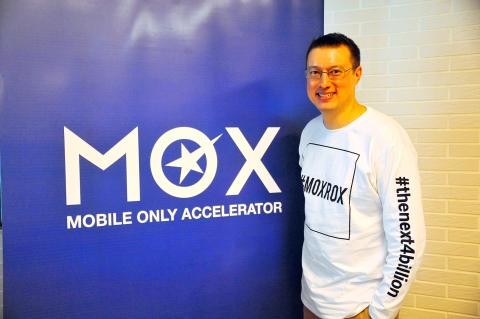About halfway through his two-month stay in Taipei, Internet entrepreneur Stefano Roncari decided to start up his new venture here after being based in Beijing for the past decade.
In addition to the city’s livability, Roncari found that there wasn’t just an abundance of quality engineers and machine learning specialists in Taiwan, but unlike Beijing, where most people want to be part of a huge company, he says a high percentage of them are passionate about startups.
“It’s a smaller market, and people [in Taiwan] are used to solving their own problems and making an impact,” he says. “They want to be working in a small team.”

Photo: Han Cheung, Taipei Times
Roncari arrived in Taipei in January as one of eight startups selected by MOX, a Silicon Valley-style mobile-only accelerator, for its first batch of businesses after launching in December. This batch, which includes companies based in India, Israel, South Korea and the US, just concluded demo days in Taipei and Singapore last week where they presented their ideas to potential partners and investors.
The Taipei-based MOX provides capital, industry and business mentors, networking and client resources and other services in exchange for equity and revenue share for companies who want to move into areas like Southeast Asia, Eastern Europe and South America where people primarily access the Internet through their mobile phones.
The eight companies vary in services and stage of development, ranging from MyBrana, an augmented reality video creator to Tappy Toon, a “Netflix” for comics, to Roncari’s Bubbleye, which uses machine learning and artificial intelligence algorithms to maximize the performance of mobile ads.

Photo: Han Cheung, Taipei Times
ACCELERATION
MOX comes from a lot of money — it is one of six global accelerators run by SOSV, a US-based US$250 million (NT$8 billion) venture fund. Each accelerator is sector-based. The companies they choose must spend at least two months in MOX’s Taipei office, working closely with Bean and other staff who “accelerate” their progress by linking them to a variety of crucial resources or helping them localize their product.
“We look at the team and traction,” MOX Managing Director William Bao Bean (賓威廉) says. “We look at users and whether they come back. We don’t care about how much money they have because they’re not paying.”
With local advertising and internet services platform General Mobile Corporation (GMobi, 通用移動) as a partner, MOX’s companies receive free advertising to Gmobi’s 100 million users in Southeast Asia.
“When you start out, the most amount of money is acquiring the customer,” Gift on the Go CEO Alok Singh says.
“With us, all you have to do is make your app awesome,” Bean says. “We’re trying to flip the model [of having to pay for advertising first].”
Bean says a big part of the work is helping these companies localize to their new target market.
“Southeast Asia is mobile first and mobile only,” he says. “You have to change your product, your user experience, how you make money.”
For example, one company had to downsize its app from 40mb to 10mb to accommodate local internet resources.
WHY TAIWAN?
Bean hopes to involve some Taiwanese companies in future batches as the company recruits its second batch later this year.
“The future of Taiwan tech is Internet,” Bean, who started his technology investment career in Taiwan, says, adding that he can help new local companies move into emerging markets.
As a mentor at Taiwan Startup Stadium, Bean had already been working with some of these locals. But when MOX made offers to several Taiwanese companies for the first batch, Bean says he found that investors were wary of this new model that required sharing equity, which isn’t popular here but is the norm in Silicon Valley.
As a global company, MOX could theoretically be based anywhere, and Bean’s answer is simple.
“It’s nice here,” he says, referring to the convenience, good food, reasonable weather and so on.
He adds that it is also a good balance of infrastructure and rent costs — falling somewhere between Hong Kong and Bangkok. Plus, Bean says you can recruit talented staff who mostly speak English for a lower cost.
Bean also hopes to foster somewhat of a local mobile startup community. For example, every week when the companies are in Taiwan and every month otherwise, MOX flies in international experts for a happy hour event that is open to the public, with free drinks and a barbecue afterward — which Bean calls a “Silicon Valley style get-together.”
Finally, he hopes to attract more people like Roncori who also find that Taiwan is a great place for an Internet startup.
“They’re moving here, they’re creating jobs,” he says. “You’re bringing international expertise from around the world and actually living here as opposed to visiting a few times. It helps create that community.”

Beijing’s ironic, abusive tantrums aimed at Japan since Japanese Prime Minister Sanae Takaichi publicly stated that a Taiwan contingency would be an existential crisis for Japan, have revealed for all the world to see that the People’s Republic of China (PRC) lusts after Okinawa. We all owe Takaichi a debt of thanks for getting the PRC to make that public. The PRC and its netizens, taking their cue from the Chinese Communist Party (CCP), are presenting Okinawa by mirroring the claims about Taiwan. Official PRC propaganda organs began to wax lyrical about Okinawa’s “unsettled status” beginning last month. A Global

Youngdoung Tenzin is living history of modern Tibet. The Chinese government on Dec. 22 last year sanctioned him along with 19 other Canadians who were associated with the Canada Tibet Committee and the Uighur Rights Advocacy Project. A former political chair of the Canadian Tibetan Association of Ontario and community outreach manager for the Canada Tibet Committee, he is now a lecturer and researcher in Environmental Chemistry at the University of Toronto. “I was born into a nomadic Tibetan family in Tibet,” he says. “I came to India in 1999, when I was 11. I even met [His Holiness] the 14th the Dalai

We lay transfixed under our blankets as the silhouettes of manta rays temporarily eclipsed the moon above us, and flickers of shadow at our feet revealed smaller fish darting in and out of the shelter of the sunken ship. Unwilling to close our eyes against this magnificent spectacle, we continued to watch, oohing and aahing, until the darkness and the exhaustion of the day’s events finally caught up with us and we fell into a deep slumber. Falling asleep under 1.5 million gallons of seawater in relative comfort was undoubtedly the highlight of the weekend, but the rest of the tour

Music played in a wedding hall in western Japan as Yurina Noguchi, wearing a white gown and tiara, dabbed away tears, taking in the words of her husband-to-be: an AI-generated persona gazing out from a smartphone screen. “At first, Klaus was just someone to talk with, but we gradually became closer,” said the 32-year-old call center operator, referring to the artificial intelligence persona. “I started to have feelings for Klaus. We started dating and after a while he proposed to me. I accepted, and now we’re a couple.” Many in Japan, the birthplace of anime, have shown extreme devotion to fictional characters and